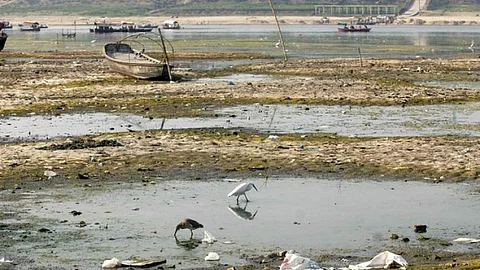
- Topics
- Feature
- Opportunities & Events
- About
- Hindi Portal
- Data
- Topics
- Feature
- Opportunities & Events
- About
- Hindi Portal
- Data

Taking note of polluted rivers in the country, the National Green Tribunal has ordered local bodies and concerned departments to ensure 100 percent treatment of sewage entering rivers across the country, by March 31st 2020. In the case of non-compliance, the NGT has warned authorities that they will be liable to pay Rs 5 lakh a month per drain in the Ganges. The NGT has also ordered for the setting up of an institutional mechanism to ensure compliance.
"Effective governance is the need of the hour. If pollution does not stop, the industry has to be stopped. If sewage dumping does not stop, local bodies have to be made accountable and the heads of local bodies are to be prosecuted."
(Financial Express)
To check groundwater depletion in the state, the Punjab Cabinet has given its approval to create the Punjab Water Regulation and Development Authority. Although the authority will be empowered to issue directions on water extraction, it will not be authorised to impose any restrictions or tariff on extraction of water for drinking, domestic and agriculture purposes. With no power to regulate tariff, the new version of the authority is being seen as bypassing the Central Ground Water Authority’s guidelines that provides for every state to have its own authority to ensure stringent steps to limit groundwater extraction. (Business Standard, The Indian Express)
The National Green Tribunal has ordered all coastal states and Union Territories to submit action plans to the Central Pollution Control Board (CPCB) to prevent sewage and industrial effluents from being discharged into the sea. As per the tribunal orders, the relevant information should be provided to the CPCB within one month of the direction, failing which defaulting states and Union Territories will be liable to pay Rs 10 lakh each month until they comply. The tribunal has also ordered CPCB to submit a comprehensive status report with regard to coastal pollution by way of classification of coastal areas in priority-I to V within three months positively. (Business Standard)
In connection with the floods in Maharashtra and Karnataka in August this year, the National Human Rights Commission (NHRC) has asked the Centre to look into the issue of establishing a central monitoring agency to manage and control water resources that are shared by two or more states within specific time limit. The order has come following a petition filed that blamed the 'careless attitude' of two state governments and the Centre for the flood which led to loss of over 40 lives, thousands of livestock, and large scale destruction of crops and property. (The Indian Express)
Clearing its stand regarding definition of forests, the Environment Ministry has objected to Uttarakhand's modification of the definition of a forest. In the order, the Uttarakhand government described 'deemed forests' as any area having over 10 hectares or more of land with 60 percent canopy density and over 75 percent native tree species. The ministry also upheld the Supreme Court's 1996 order which clarified the interpretation of forest. Along with this, the ministry also gave clear instructions to states to stay away from issuing any contradictory communication. (The Times of India)
This is a roundup of important policy matters from December 1- 9, 2019. Also, read news this week.